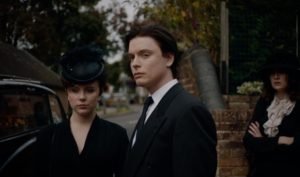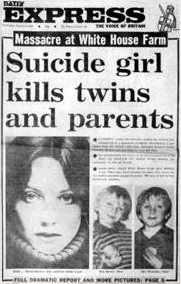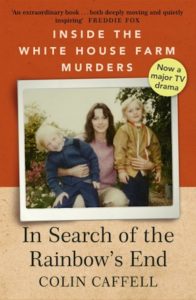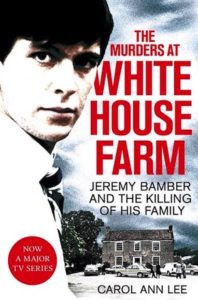Moving on from murder
by Mark Reynolds
Freddie Fox as Jeremy Bamber and Alexa Davies as Julie Mugford at the funeral of June and Nevill Bamber and Sheila Caffell in White House Farm © ITV
“Massacre at White House Farm: Suicide girl kills twins and parents,” screamed the front page of the Daily Express on 8 August 1985. Throughout the British press, the horrific events left no room for doubt. “A farming family affectionately dubbed ‘the Archers’ was slaughtered in a bloodbath yesterday,” continued the Express. “Brandishing a gun taken from her father’s collection, deranged divorcee Sheila Bamber, 28, first shot her six-year-old sons. She gunned down her father as he tried to phone for help. Then she murdered her mother before turning the automatic .22 rifle on herself.” The picture of a rural English idyll brutally interrupted by a spurned madwoman was based on a scant police briefing and sensationalist speculation, but the story was only reinforced in the weeks that followed, with the tabloids portraying the supposed killer as a former ‘top model’ turned ‘hell raiser’ whose huge debts from a drug habit led to a string of house burglaries.
The overstretched Essex police force, under pressure from formidable chief investigating officer DCI Thomas ‘Taff’ Jones, considered the shootings an open-and-shut case of murder-suicide. The simple facts were that Sheila’s brother, Jeremy Bamber, had phoned Chelmsford police station in the small hours of the night of the shootings to report a frenzied call from his father Nevill, saying Sheila had “gone berserk” at the farmhouse with a gun. The doors and windows were all locked from the inside, and Sheila was found lying dead from neck wounds with the murder weapon clutched in her hands. The crime scene was secured, then rather abruptly dismantled.
The turning point finally came when Jeremy’s girlfriend Julie Mugford went to the police a month after the shootings with an account of how he planned to carry out the murders.”
 Among a small group of dissenting officers, DS Stan Jones had the gravest doubts about the findings. How had Sheila received two fatal wounds if it was suicide? Did she even know how to handle firearms? Could this slightly-built and physically frail young woman really have overcome her robust 6’4” farmer father in what was clearly a bloody struggle in the overturned kitchen? And even if heavily medicated and prone to deep depression, would she have been capable of taking the lives of her own twin boys Daniel and Nicholas? Several family members, notably Jeremy’s cousin Ann Eaton, grew convinced that Jeremy was in fact the killer, but no forensic evidence emerged to back their suspicions. The turning point finally came when Jeremy’s girlfriend Julie Mugford went to the police a month after the shootings with an account of how he planned to carry out the murders, including vital information about how an escape through a downstairs window could be concealed because it could be made to lock from the outside.
Among a small group of dissenting officers, DS Stan Jones had the gravest doubts about the findings. How had Sheila received two fatal wounds if it was suicide? Did she even know how to handle firearms? Could this slightly-built and physically frail young woman really have overcome her robust 6’4” farmer father in what was clearly a bloody struggle in the overturned kitchen? And even if heavily medicated and prone to deep depression, would she have been capable of taking the lives of her own twin boys Daniel and Nicholas? Several family members, notably Jeremy’s cousin Ann Eaton, grew convinced that Jeremy was in fact the killer, but no forensic evidence emerged to back their suspicions. The turning point finally came when Jeremy’s girlfriend Julie Mugford went to the police a month after the shootings with an account of how he planned to carry out the murders, including vital information about how an escape through a downstairs window could be concealed because it could be made to lock from the outside.
The case was reopened and Jeremy went to trial, and in October 1986 was convicted of the murders, subject to a whole-life order. He has repeatedly appealed the sentence and maintains his innocence to this day, but remains behind bars.
ITV’s admirably restrained six-part factual drama White House Farm provides comprehensive insight into this family tragedy and the contested accounts of the events that took place at the farm. Kris Mrksa’s script is based on extensive research, interviews and published accounts including Carol Ann Lee’s meticulous reconstruction of events before, during and after the killings, The Murders at White House Farm, and insightful material from In Search of the Rainbow’s End by Colin Caffell, ex-husband of Sheila and father to Daniel and Nicholas.
Before she was diagnosed and medicated Sheila could be explosive as a way of dealing with her frustration. But she was only ever destructive towards inanimate objects. As a mother to the twins, she was always kind and loving.”
 “This is an incredibly compelling true crime story,” says Kris Mrska, “but it’s the human dimension of these events that gripped my imagination, particularly after reading Colin Caffell’s book. So much discussion of the case has focused on contested legal details, but I wanted to tell this story in a way that did justice to the devastating emotional truth of what happened… Colin writes eloquently of the almost inconceivable pain of losing his sons at the hands of a man who subsequently attempted to court his support and friendship – support which Colin initially gave. But he also speaks of transcending that horror, of finding peace and even a kind of forgiveness.”
“This is an incredibly compelling true crime story,” says Kris Mrska, “but it’s the human dimension of these events that gripped my imagination, particularly after reading Colin Caffell’s book. So much discussion of the case has focused on contested legal details, but I wanted to tell this story in a way that did justice to the devastating emotional truth of what happened… Colin writes eloquently of the almost inconceivable pain of losing his sons at the hands of a man who subsequently attempted to court his support and friendship – support which Colin initially gave. But he also speaks of transcending that horror, of finding peace and even a kind of forgiveness.”
“I’ve been approached numerous times by all sorts of production companies, journalists and writers,” says Colin Cafell. “But this was the first time I had been approached with real respect and sensitivity. Enough to make me willing to go and meet the people involved and find out a bit more. When I met Kris and executive producer Willow Grylls I was very impressed. I felt safe with them. I felt very listened to. That’s why I got involved because I wanted to help them get the story right. Sheila was a passionate young woman, hungry for loving affirmation. Before she was diagnosed and medicated she could be explosive as a way of dealing with her frustration. But she was only ever destructive towards inanimate objects, breaking things in order to cause a reaction in others, usually me. As a mother to the twins, she was always kind and loving, playful, like a lioness with her cubs, never ever angry with them.
“People forget the details of this case but so many have stuck in their mind the impression that Sheila was a drug addict. She was not a drug addict. Sheila was very subdued by her prescribed medication. At the end of the day I know this has to work as a drama, I have no doubts about that but they have done it very well. It exonerates Sheila.”
White House Farm, produced by New Pictures, was broadcast on ITV in January/February 2020 and is now on catch-up on the ITV Hub. It stars Freddie Fox as Jeremy Bamber, Mark Addy as DS Stan Jones, Stephen Graham as DCI ‘Taff’ Jones, Mark Stanley as Colin Caffell, Cressida Bonas as Sheila, Alexa Davies as Julie Mugford and Gemma Whelan as Ann Eaton.
ITV Hub
@ITV
 The Murders at White House Farm by Carol Ann Lee is published by Pan.
The Murders at White House Farm by Carol Ann Lee is published by Pan.
Read more
@panmacmillan
In Search of the Rainbow’s End by Colin Caffell is published by Hodder & Stoughton.
Read more
@HodderBooks
Mark Reynolds is a freelance editor and writer, and a founding editor of Bookanista.
@bookanista
wearebookanista

